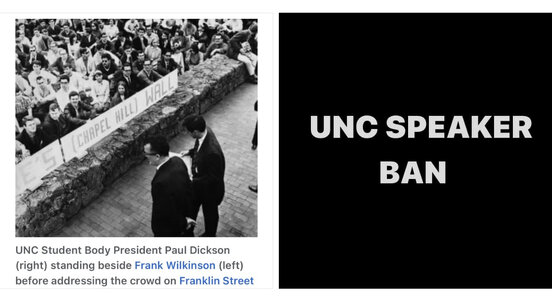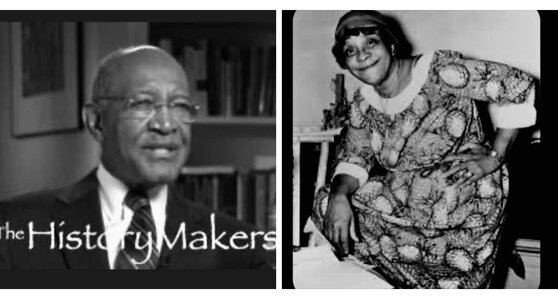 #OTD
#OTD (June 25) in 1963 the Right-Wing of the North Carolina General Assembly Ramrodded legislation known as “The Speaker Ban” through on the Final Day of the Session. Most Never Read It -- Just Did as They Were Directed. An Unconstitutional Embarrassment, it Damned North Carolina and Threatened Accreditation of all the UNC System schools, first and foremost, UNC Chapel Hill.
Students and President William Friday Fought the Bill as it crippled the University’s ability to provide a free and robust education with access to the broad spectrum of ideas and ways of seeing and thinking. The bill most specifically prohibited “the use of any state-supported college or university facilities by anyone who was a communist, had advocated the overthrow of the United States or North Carolina Constitutions, or had pled the Fifth Amendment when questioned about communist or subversive activities.” The word communist was the ‘red flag’ or better said, the ‘red meat’ for that segment of the public racked with Cold War paranoia but the bill was also written so as to potentially forbid or otherwise make it so problematic as to essentially bar a person who opposed segregation or other, as interpreted by the courts at the time, seemingly constitutional practices.
Locally, WRAL TV commentator Jesse Helms reveled in the curtailing of campus speech while nationally other Cold War pundits and politicians who saw Red everywhere welcomed the opportunity to attack college professors freely.
Students and the university administration immediately recognized that ‘The Speaker Ban’ threatened to make North Carolina a Right Wing Echo Chamber where only voices sanctioned by Segregationist or Red-=Baiting Conservatives could discuss, debate, or otherwise be heard on UNC System campuses. In 1963 that system consisted of UNC, N.C. State, and Women’s College (UNCG). UNC Charlotte, UNC Asheville, and UNC Wilmington would join in 1969 and ten more, including the HBCUs (A&T, ECSU, WSS, FSU, NC Central), Pembroke State (a historically American Indian campus), The NC School of the Arts, and ASU, ECU, WCU completed the grouping in 1971.
While the system administration fought the bill in traditional ways, students set out to “roil the waters” by directly confronting it. UNC Student Government, led by Student Body President Paul Dickson, and students representing other campus constituencies (George Nicholson, Robert Powell, James Medford, Eunice Milton, John Greenbacker, Eric Van Loon, Ernest McCrary, Gary Waller, Stuart Matthews, John McSween, and Henry Patterson were all plaintiffs in a subsequent law suit), challenged the law by inviting two speakers, Historian Herbert Aptheker and Fred Wilkinson, the Executive Director of the National Committee Against Repressive Legislation and the First Amendment Foundation that would violate the bill. Wilkinson’s work was in challenging prohibitions against free speech while Aptheker was a historian who applied Marxist methodology to interpret African American History, a field of study radical in its own right at the time.
UNC refused to permit the speakers, who were escorted off campus. This was expected and both then spoke from a Chapel Hill town sidewalk but across a knee-high stone wall where students gathered to listen on campus. Five years of court battles finally resulted in “The Speaker Ban” being declared unconstitutional.
Today much cleverer tactics from Modern Conservatives threaten the entire UNC System’s capability to provide a broad Liberal Arts Education. The Right Wing has gained control of the General Assembly and has managed to also create of the system Board of Governors a cast of proxies who have in turn set about making sure that the system President and Chancellors of the individual campuses are themselves part of the plan to tamp down critical thinking and efforts to diversify that threaten a traditional status quo resembling pre-Speaker Ban times. Across the 16 campuses these efforts by the majority in the General Assembly are ongoing. The Right holds most of the power and may yet make of the system schools mere shells of themselves. Time will tell. Elections have consequences. Decide how much you care.
Speaker Ban Roiled UNC-Chapel Hill Campus

